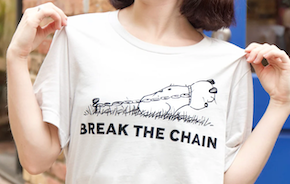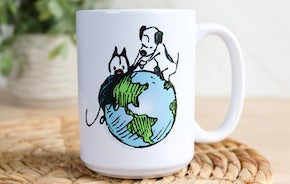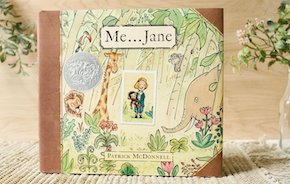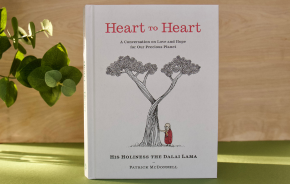By Avril Brown
Until I started working directly with animals, I was only vaguely aware of the conditions street animals face in Europe. I also had no idea how straightforward and inexpensive it is to adopt one of those strays. Once I met and was inspired by people who had actually done it, it was so very easy to say “yes” when a cat named Maisie Mog (then called Plurabelle) was offered for adoption in 2016.

Maisie Mog and Hamish, above, are my “Rommie rescues.” I also call them my Euro-kitties. Both were found on the streets of Bucharest, Romania and probably share at least some of the same genes. Maisie might have had a home at some point, but it was -15°C (5°F) when she was found, suffering with cat flu and ice burns on her face from trying to lick frozen food and water. Barely out of kittenhood herself, this wee cat was also discovered to be pregnant when she was spayed.
Hamish was still a kitten when he was spotted hiding under a car all on his own. He was probably born on the streets.
Maisie and Hamish were two of the lucky ones. Rescued by a kindhearted local lady named Eugenia, they were housed, fed, loved, and given veterinary care until they came to us in Scotland.

Rural Romania is beautiful, but its towns and cities reflect Nicolae Ceaușescu’s desire for the creation of an “industrial evolved Romania” via a systematization program of rural resettlement. In the rush to urbanization, country people were forced into overcrowded apartment complexes, often with several families in one flat. There was no space for animals, so they were abandoned to fend for themselves. With no culture of spaying and neutering in the country, the inevitable happened — a population explosion of feral dogs and cats.
The animal population continued to rise. In 1988 the mayor of Bucharest decided that the only way to resolve the problem was to kill all the strays. Other cities followed his lead. Despite the painful deaths of thousands of animals, the population did not diminish. In 2014 the Romanian government authorized mass culls, eventually euthanizing over 300,000 animals, mainly dogs.
Now the stray population is a both a political and a business issue. Romania remains a relatively impoverished country where the average monthly salary is around €540 ($645). In a country where animals are allegedly “not important” and there is money to be made from catching stray dogs — about €50 ($56) per dog in 2016 — the welfare conditions in public shelters remain very poor.
There is no public shelter provision for cats.
For those animals fortunate enough to get out of the appalling municipal shelters, there is still a long journey to safety.

Lucky dogs (and cats) make their way either to private shelters, pensions, or fosters, often sponsored by foreign funders. They will stay here until permanent homes can be found, ideally outside Romania. Favored locations for these “Rommie rescues” include the UK, Germany, the Netherlands, and the Nordic nations — wealthier countries with established cultures of pet guardianship and good reputations for animal welfare. Some British charities regularly import animals from the shelters into the UK, where they await either fostering or adoption.
It is worth pointing out that Romania is far from alone in its problems with strays and how it deals with them. Other European countries — including Bosnia, Cyprus, Serbia, and Turkey — all have similar issues. In some places animal suffering may be overlooked due to ingrained cultural, historical and occasionally religious prejudices. In others, it is simply that life is already hard enough for people, and there is nothing left over for the animals.
Since Romania is a member of the European Union, its cats and dogs can travel freely to other EU countries so long as they have an approved “pet passport.” This document, issued by in-country vets, confirms the animal’s identity and that it has been microchipped, vaccinated against rabies and other species-specific conditions, and has been treated against worms and fleas.
The situation with the current pet passport scheme will obviously change if, or indeed when, the UK leaves the European Union. It is hoped that the country will be able to conclude a deal with the EU so that it can still participate in the system.

Once we had formally agreed to adopt Maisie, her pet passport was organized. This cost €60 ($67). With this, I was able to book her travel to Scotland. Like most of the rescue animals traveling within Europe, Maisie was driven three days overland in a specially adapted van before crossing into the UK via the Channel Tunnel. We anxiously met her transport on July 2, 2016 at Gretna Green on the Scotland-England border, before making the 90-mile return journey to Edinburgh to get her home.
We loved her from the minute she emerged from the carrier, full of life and play and nonsense. We loved her so much that we did it all again three months later. This time our sweet boy Hamish arrived on October 22. He came to us from Eugenia as well, but traveled with a different transport company. His journey was broken for two days in England, before we were able to pick him up a bit closer to home in the West Lothian town of Livingston. Hamish has been his mama’s boy since the moment he came out of his carrier and tried to sit on my head! Even though he now tips the scales at over 5.5kg, he still likes to be on my shoulder whenever possible.
We are so lucky to have both Maisie and Hamish. Despite their difficult starts, they are two of the best and friendliest cats you could hope to have in your life. Hamish is honestly the most ridiculously kissy, cuddly cat. His main ambitions in life are to have food, cuddles, and tummy rubs. Maisie wants to play, to have boxes to shred and to be warm, which generally means being on daddy’s lap or climbing under the covers with us most nights like a furry and occasionally slightly bitey hot water bottle.

We have never regretted bringing either of our Euro-kitties to live with us, and we feel that we have generally done a Good Thing. We know that there are still many homeless cats (and dogs) in the UK, but at least we are blessed with many amazing shelters such as Lothian Cat Rescue, Sunny Harbour Cat & Kitten Rescue, and Fife Cat Shelter — as well as many branches of Cats Protection and the Dogs’ Trust, plus the Edinburgh Dog & Cat Home. We regularly donate to them, in addition to sponsoring long-term residents.
Not all Rommie rescuers are so fortunate. Many animals are understandably traumatized by what has happened to them, and dogs in particular can arrive with all sorts of behavioral issues. These issues can take a whole lot of patience and many years to resolve. Britain’s dog rescue charity the Dogs’ Trust do not approve of bringing Romanian dogs to the UK, citing health and behavior risks. However, the charity’s stringent adoption conditions often exclude many people from rehoming a dog. These are the people who may then look abroad for their new friend.
Although adopting from outside your own country has its challenges, it is one of the most worthwhile things you can ever do. You are quite literally saving an animal’s life. The local rescuers will be equally grateful, too.


Blessed are the rescuers, for their hearts are full of love.























Comments (9)